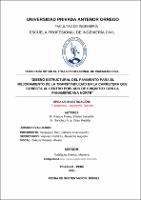Diseño estructural del pavimento para el mejoramiento de la transitabilidad en la carretera que conecta al centro poblado de chiquitoy y con la Panamericana Norte

View/
Download
(application/pdf: 252.3Kb)
(application/pdf: 252.3Kb)
Date
2022Author(s)
Ramos Flores, Shirley Josselhin
Sanchez Alza, Criss Medalyt
Metadata
Show full item recordAbstract
Este trabajo de investigación tiene como objetivo determinar el diseño estructural
del pavimento que mejore la transitabilidad en la carretera que conecta al centro
poblado Chiquitoy con la Panamericana Norte, mediante una investigación
descriptiva - aplicada. Dicha carretera actualmente se encuentra sin pavimentar
ocasionando inseguridad, retrasos, mayor costo del transporte y dificultad para
acceder a los bienes y servicios.
Se diseñará la estructura del pavimento por la metodología American Association
Of State Highway and Transportation Officials (AASHTO 93), tomando en cuenta
las Normas Técnicas Peruanas (Manual de carreteras: suelos, geología, geotecnia
y pavimentos, 2013); la cual nos ayudó a establecer los espesores del pavimento
rígido y flexible.
Los estudios realizados para determinar el diseño estructural del pavimento fueron:
estudio de tráfico, con el cual se determinó que el tráfico proyectado para 20 años
es 2’465,211 para el pavimento flexible y 3’189,839 para el pavimento rígido; y en
el estudio de suelo, en los ensayos realizados determinaron que el suelo está
conformado por estratos de grava pobremente graduada y arena pobremente
graduada, presentando un CBR en la subrasante de 13.70%.
Los espesores establecidos de acuerdo al diseño estructural realizado en el
pavimento flexible: su carpeta asfáltica en caliente será de 5 cm, base 30 cm y sub
base 15 cm; con un costo directo de cinco millones ochocientos catorce mil setenta
y siete con 50/100 soles (s/ 5’814,077.50) y para el pavimento rígido: su capa de
losa de concreto será de 20 cm con un f’c= 280kg/cm2 y sub base 15 cm; con un
costo directo de siete millones quinientos sesenta y cinco con 60/100 soles (s/
7’000,565.60).
La conclusión de esta investigación es que el pavimento flexible sería el diseño
más recomendable por su funcionabilidad y por ser más económico respecto al
pavimento rígido. The objective of this research work is to determine the structural design of the
pavement that improves the walkability of the highway that connects the Chiquitoy
town center with the Panamericana Norte, a descriptive-applied research. This road
is currently unpaved causing insecurity, delays, higher transportation costs and
difficulty in accessing goods and services.
The pavement structure will be designed by the American Association Of State
Highway and Transportation Officials methodology (AASHTO 93), taking into
account the Peruvian Technical Standards (Manual of highways: soils, geology,
geotechnics and pavements, 2013); which helped us to establish the thicknesses of
the rigid and flexible pavement.
The studies carried out to determine the structural design of the pavement were:
traffic study, with which it was determined that the projected traffic for 20 years is
2'465,211 for flexible pavement and 3'189,839 for rigid pavement; and in the soil
study, in the tests carried out they determined that the soil is made up of layers of
poorly graded gravel and poorly graded sand, presenting a CBR in the subgrade of
13.70%.
The thicknesses established according to the structural design made in the flexible
pavement: its hot asphalt layer will be 5 cm, base 30 cm and sub base 15 cm; with
a direct cost of five million eight hundred fourteen thousand seventy-seven with
50/100 soles (s / 5'814,077.50) and for the rigid pavement: its layer of concrete slab
will be 20 cm with an f'c = 280kg / cm2 and subbase 15 cm; with a direct cost of
seven million five hundred and sixty-five with 60/100 soles (s / 7'000,565.60).
The conclusion of this research is that flexible flooring would be the most
recommended design due to its functionality and because it is more economical
compared to rigid flooring
Subject
Collections
- Ingeniería Civil [1260]

